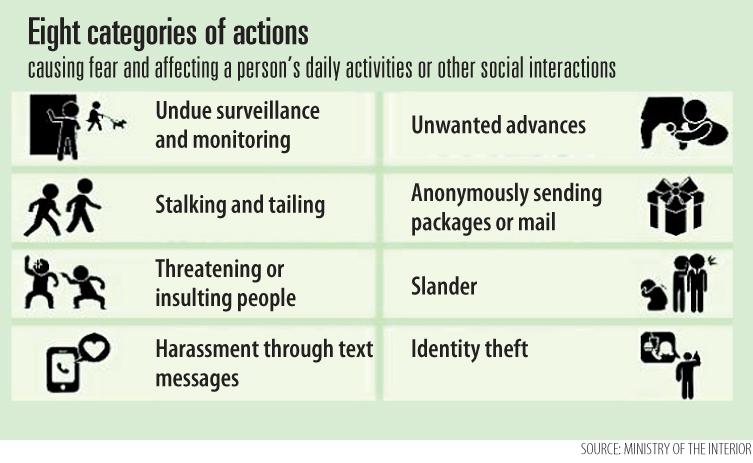Police have identified 2,734 people implicated in stalking or related crimes over the past three years, and stepped up patrols and officer training in preparation for the June enactment of a stalking prevention law.
After years of debate, the Legislative Yuan in December last year passed the Stalking and Harassment Prevention Act (跟蹤騷擾防制法), which is to go into effect on June 1.
Earlier in 2019, the National Police Agency instituted a plan to combat stalking, which included compiling monthly data on cases at risk of repeat offense.

Photo courtesy of the Ministry of the Interior
The agency said that 2,734 people were implicated in stalking or related crimes between July 2019 and December last year.
Of those, 1,543 cases (56.4 percent) were classified as sexual harassment, while 619 (22.4 percent) were cases of domestic violence, although those cases after January 2020 were reclassified as a more serious criminal offense under the Domestic Violence Prevention Act (家庭暴力防治法) and therefore are no longer included in the agency’s stalking statistics.
About 8.7 percent, or 239 people, were implicated over contraventions of criminal law, such as coercion, indecent exposure, assault or offenses against privacy.
The agency also found 189 cases of workplace discrimination, 76 contraventions of social order — such as stalking “without justifiable reasons,” peeping or other unexplained harassment — and 59 cases of discrimination under educational law.
Under the new law, stalking is defined as behavior intended to repeatedly exert “anything sexual or gender-related toward a specific person against his/her will, which intimidates such specific person and sufficiently affects his/her daily life or social activities.”
It also lists eight activities that would constitute stalking.
Under the new law, police are authorized to issue a protective order if an initial warning is ignored within two years. A perpetrator could then be arrested if the order is contravened, with the option for preventive detention if approved by a court.
To ease the transition when the new law goes into effect, the agency said it would continue following its 2019 plan, and advise precincts on how to handle cases under current and future laws on an individual basis.
It also vowed to review incident hotspots and times of day when reports are made, and step up patrols accordingly, while also expanding regular patrols to include known harassers.
Since there is considerable overlap of domestic violence, social order, harassment and other types of incidents, the agency said it is working to improve officers’ familiarity with the new law and when to apply it.
For example, in New Taipei City, the number of sexual harassment cases decreased by nearly 10 percent between 2020 and last year, while the number of related criminal offenses such as coercion and obstruction of freedom increased by 11.3 percent, the agency said.
This shows that officers are gaining a better understanding of the nature of stalking and harassment, it said.
Officers’ newly instituted ability to issue protective orders and pre-emptively detain perpetrators is also expected to greatly reduce incidents and “fill in the last piece of gendered violence prevention,” it added.
Additional reporting by Hsu Kuo-chen

CAUTION: Based on intelligence from the nation’s security agencies, MOFA has cautioned Taiwanese travelers about heightened safety risks in China-friendly countries The Ministry of Foreign Affairs (MOFA) yesterday urged Taiwanese to be aware of their safety when traveling abroad, especially in countries that are friendly to China. China in June last year issued 22 guidelines that allow its courts to try in absentia and sentence to death so-called “diehard” Taiwanese independence activists, even though Chinese courts have no jurisdiction in Taiwan. Late last month, a senior Chinese official gave closed-door instructions to state security units to implement the guidelines in countries friendly to China, a government memo and a senior Taiwan security official said, based on information gathered by Taiwan’s intelligence agency. The

Taiwan Semiconductor Manufacturing Co (TSMC), the world’s largest contract chipmaker, said yesterday that it is looking to hire 8,000 people this year, at a time when the tech giant is expanding production capacity to maintain its lead over competitors. To attract talent, TSMC would launch a large-scale recruitment campaign on campuses across Taiwan, where a newly recruited engineer with a master’s degree could expect to receive an average salary of NT$2.2 million (US$60,912), which is much higher than the 2023 national average of NT$709,000 for those in the same category, according to government statistics. TSMC, which accounted for more than 60 percent

The National Immigration Agency (NIA) said yesterday that it will revoke the dependent-based residence permit of a Chinese social media influencer who reportedly “openly advocated for [China’s] unification through military force” with Taiwan. The Chinese national, identified by her surname Liu (劉), will have her residence permit revoked in accordance with Article 14 of the “Measures for the permission of family- based residence, long-term residence and settlement of people from the Mainland Area in the Taiwan Area,” the NIA said in a news release. The agency explained it received reports that Liu made “unifying Taiwan through military force” statements on her online

Tung Tzu-hsien (童子賢), a Taiwanese businessman and deputy convener of the nation’s National Climate Change Committee, said yesterday that “electrical power is national power” and nuclear energy is “very important to Taiwan.” Tung made the remarks, suggesting that his views do not align with the country’s current official policy of phasing out nuclear energy, at a forum organized by the Taiwan People’s Party titled “Challenges and Prospects of Taiwan’s AI Industry and Energy Policy.” “Taiwan is currently pursuing industries with high added- value and is developing vigorously, and this all requires electricity,” said the chairman